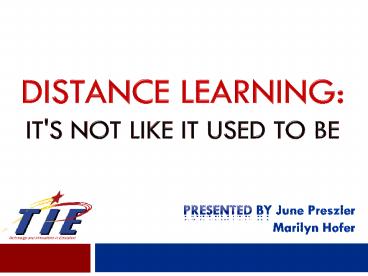Distance Learning: It's Not Like It Used to Be PowerPoint PPT Presentation
1 / 15
Title: Distance Learning: It's Not Like It Used to Be
1
Distance Learning It's Not Like It Used to Be
- Presented by Julie Mathiesen, TIE Deputy Director
Presented by June Preszler Marilyn Hofer
2
Outcomes
- Participants will engage in discussion regarding
- Differences between online and traditional
learning and teaching experiences - Characteristics of effective online learners
- Innovative but simple online tools used to
enhance distance learning
3
Outcomes
- Participants will engage in discussion regarding
- Differences between online and traditional
learning and teaching experiences - Characteristics of effective online learners
- Innovative but simple online tools used to
enhance distance learning
4
Learning and Teaching Phases
5
Differences Between Online and Traditional
Learning and Teaching Experiences
6
Articulating understandings, raising questions,
and examining others' assertions
- As a learner, what do you notice about the table
describing the assumptions about learning and
teaching? - As a traditional learner, what questions does
this raise for you? - As an online learner, what questions does this
raise for you? - Respond to your partners thinking.
7
Outcomes
- Participants will engage in discussion regarding
- Differences between online and traditional
learning and teaching experiences - Characteristics of effective online learners
- Innovative but simple online tools used to
enhance distance learning
8
Distance Education
- Perception
- Reality
- Easy
- Less demanding
- For those who cant make it any other way
- Independent
- Frees up time
- Unscheduled
- Convenient
- Rigorous and challenging
- Option for those open to the nontraditional
- Interdependent
- Eats up time
- Self-disciplined
9
What Does It Take?
- To be a successful online learner
- Possesses Internet comfort level and access
- Demonstrates adequate (or better) writing skills
- Is able to develop a time management strategy
- Consistently interacts in online discussions
- Shows a willingness to ask questions
- Has a sense of self-motivation
- Works with effective online instructors
- Roper, Alan R.. "How Students Develop Online
Learning Styles." EDUCAUSE Quarterly 30.1 (2007)
62-65. - Schall, Daniel, Stephanie Schmidt, Kristan
Stewart-Burns, and Scott Stiverson. "A Critical
Look at Online Learners and Teachers." Center for
Online Educators Home Page. 3 Apr. 2008
lthttp//educatoronline.org/criticallookarticle.htm
gt.
10
What Does It Take?
- Qualities of the successful online instructor
- Is able to let go of traditional teaching
concepts and give up some control - Encourages a learning community that empowers the
learner - Understands online processes, possesses strong
technical skills - Demonstrates online moderation/communication
skills - Possesses topic knowledge
- Asks probing, higher level questions
- Schall, Daniel , Stephanie Schmidt, Kristan
Stewart-Burns, and Scott Stiverson. "A Critical
Look at Online Learners and Teachers." Center for
Online Educators Home Page. 3 Apr. 2008
lthttp//educatoronline.org/criticallookarticle.htm
gt. - Palloff, Rena, and Keith Pratt. Lessons from the
Cyberspace Classroom. San Francisco Jossey-Bass,
2001.
11
Innovative Yet Simple Online Tools
- SurveyMonkey
- http//www.surveymonkey.com
- Web-based text documents
- Writeboard http//writeboard.com/
- Google docs http//docs.google.com/
- Tapped In
- http//tappedin.org/tappedin/
- http//www.k12.sd.us/WebCT/
- http//webct6.k12.sd.us/webct/entryPageIns.dowebct
- http//pls.blackboard.com/
12
What Do You Think?
- A strong student in the traditional classroom
will translate into a strong student online. - An effective classroom teacher will be an
effective online instructor. - Three-Minute Pause Discuss with an elbow partner
- Our Writeboard discussion area
- http//writeboard.com/f60af4482f782d0e1
- Password TIE08
13
Power to the Introvert
- Distance education could well be the introverts
stomping ground. - Introverts appear extroverted online
- Introverts are better able to take time, reflect,
and present themselves through text they are
less dependent upon face-to-face interaction - Introverts are more adept at creating a virtual
environment because they process information
internally and are less outgoing socially.
(Palloff and Pratt) - Palloff, Rena, and Keith Pratt. Lessons from the
Cyberspace Classroom. San Francisco Jossey-Bass,
2001.
14
One Final Online Tool
BibMe Online bibliography tool for MLA, APA,
Chicago Tool used to cite references in this
presentation http//www.bibme.org/
15
Outcomes
- Participants will engage in discussion regarding
- Differences between online and traditional
learning and teaching experiences - Characteristics of effective online learners
- Innovative but simple online tools used to
enhance distance learning - Marilyn Hofer, mhofer_at_tie.net, http//mhofer.tie.w
ikispaces.net/ - June Preszler, jpreszler_at_tie.net,
http//jpreszler.tie.wikispaces.net/

